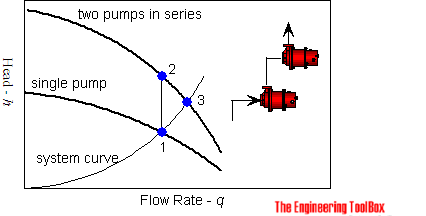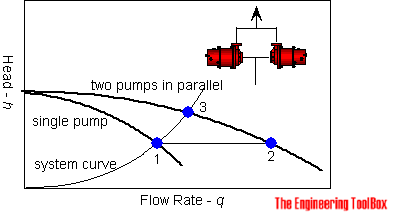26/03/2023, Sunday, 20:01
Edit²:
I dunno where to insert this information, but...
You see, I was kinda doubtful of the possibility of the prospect of simply taking a 500 liters per minute pump that can achieve 0.8 bars of pressure and simply turning it in a multistage pump.
I assumed that the power consumption would just increase by 10 times, so if a single stage pump needs 220 watts to achieve 500 liters per minute at 3600 rpm and 0.8 bars, maintained the same flow rate, rpm, but increased in pressure, it would "just" need 2200 watts (ten times more watts).
But unfortunately, while I was asking around if this assumption was correct, some people were saying that actually you wouldn't change much the pressure.
Besides, I was looking for centrifugal pumps that actually achieve 8 bars of pressure (some times even more) and simply multiplied these enough times to achieve the flow rate of 1500 liters per minute.
The problem is that... This pump in specific needs 1 horsepower of energy, meaning that if I stacked this specific pump that achieves 8 bars of pressure and 60 liters per minute in order to achieve 1500 liters per minute, I would need 25 of these...
Meaning that I would need 25 horsepower alone just to make this "simple" exosuit to work.
Which puts into doubt if my first assumption was actually correct.
After all, if you increase the pressure, but maintain the speed, wouldn't the torque required also increase exponentially with each stage?
I don't know, I'm going to sleep right now, whatever...
Edit³:
I saw someone asnwer the question I've made on quora really incorrectly, so I searched a little bit on google and it seems that I'm right, but I just don't know for real...


Pumps in series increase in pressure, pumps in parallel increases in flow rate.
Anyway, I just asked on other spaces just to be sure, because this specific case made me doubt myself.
Well, I inputed all the project logs of this project on ChatGPT, plus scientific articles about all kinds of actuators and this kind of stuff, and...
ChatGPT is f-cking useless.
However, while talking to it I ran the same equations I applied in my previous project logs, and I just asked about the efficiency of different types of actuators and the energy density of certain types of fuel sources.
Like double-checking what I already tried, verifying if my conclusions and assumptions were somewhat correct.
But taking into consideration how bad at math, I doubt it is of any use. For example, I asked it to take electric motors ads on online shops that I would copy and paste in the conversation, so it would run the equations again and check how much force each electric motor would be able to exert after a gear reduction box.
And guess what? It kept reducing the torque by the same number it took to reduce the speed; and no matter how much I teached again and again how to make the equation correctly, it kept making the same mistake.
Also, it even suggested me to use anti-matter fuel, lol.
Oh yeah, let me making a particle accelerator on my backyard...
Anyway, going directly to the subject:
If I can't find a power source that is dense enough to achieve 10kw/hour all day, then I need to find an actuator that is efficient enough to work all day with just 10kw (easier said than done, efficiency is precision and precision is expensive).
If my assumptions are correct, if I take the 233 hydraulic McKIbben muscles on the entire body and divided by 10 thousand watts, this means that every actuator would use around 42 watts of energy to fully actuate.
Of course, I could just add a 42 watt pump to each muscle, and each muscle would fully actuate with even less energy, because hydraulics loses a lot of energy due to the path the hydraulic fluid takes.
But again, that is easier said than done.
Where can I find 233 hydraulic pumps and 233 tiny electric motors? lol
Edit¹:
I was thinking of something like "oh, the state just changes since all the energy is already inside of it, so you would use almost no energy to change its state".
But now that I thought it a little more...
It doesn't any fricking sense.
It changes state due to the energy used, a catalyzer is the energy input. And it would use a lot of energy.
Sigh... I'm not good with these things...
Having an "eureka moment" with a engineering/chemical/physics problem that the best minds in the world couldn't solve is a feasible as being capable to having a wish becoming true...
Nothing comes into reality by magic, we need to build it into existency.
State Oscilating Chemical Compound
So, the idea was to use a chemical compound that changes its state based on the action that I take.
For example:
Let's say there is a hyphotetical chemical compound called "W" in perfect equilibrium inside a cylinder.
If I add X amount of "Y" chemical compound, the chemical compound "W" would inflate, changing its state to actuated.
If I added X amount of "Z" chemical compound, the chemical compound "W" desinflate, changing its sate to unactuated.
But instead of chemical compounds, it could be electric charges changing the state of an actuator.
Imagine it like a battery or a fuel.
When there is a lot of air and fuel (like gasoline), once an electric spark is introduced to the chemical compound (air and fuel), it changes its state to a rapid expansion; but it cannot be reversed.
When an electric battery receives an electric charge, it changes its state from oxidized to unoxidezed. And it can be reversed once the charge is liberated.
Of course, these two are very different reactions and are only used for energy generation (in the case of fuel) and for energy storage (in the case of battery).
So, if someone wanted something to do useful work, there should be a more drastic reaction and change of state...
But as y'all may be very familiar by now, I'm not a chemist, engineer or anything useful like that.
So, if you have any information that could help me, I would be grateful.
Discussions
Become a Hackaday.io Member
Create an account to leave a comment. Already have an account? Log In.